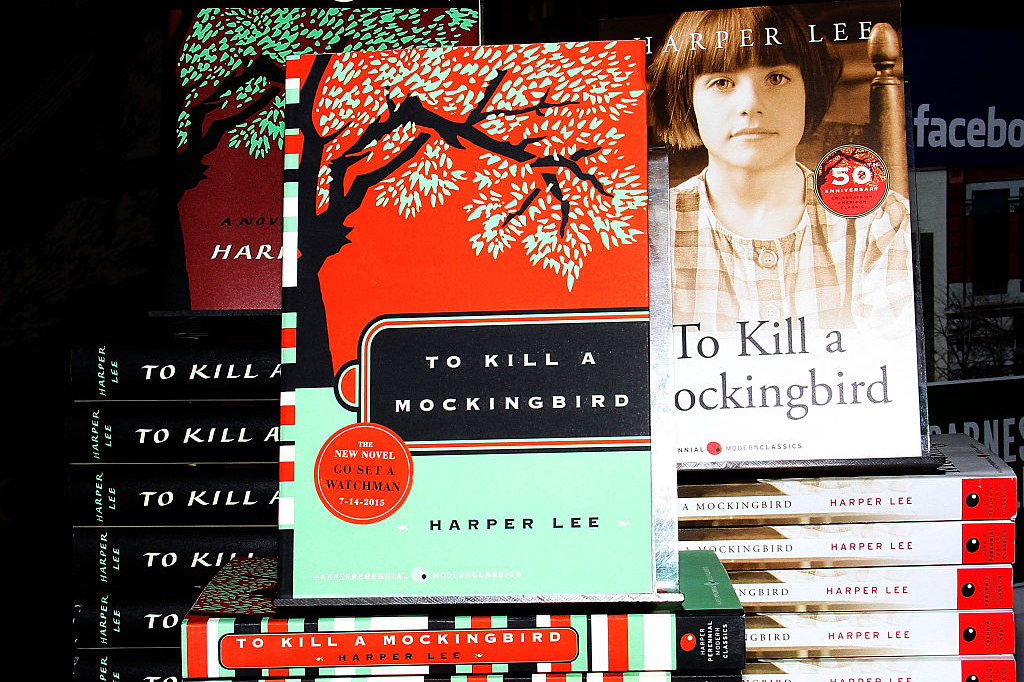On Tuesday, after a six-month long poll in which four million Americans voted, Harper Lee’s To Kill a Mockingbird was voted the US’s best-loved novel. Mockingbird is so often at the summit of such polls or described as a book ‘every adult should read before they die’ that another win is no surprise. Lee, who stopped writing fiction and giving interviews almost as soon as the novel became a phenomenon, struggled for the rest of her life with the scale of its success.
First published in 1960, as the civil rights movement hit its stride, Lee’s anti-racist novel has been handcuffed to liberalism for the last 50 years. An uncharitable reading of Mockingbird would see it as a childishly progressive fantasy. The enlightened upper-middle class, represented by the saintly lawyer Atticus Finch, heroically defends minorities against a familiar American demon — a drunken, inbred, bigoted, white trash patriarch called Robert E. Lee Ewell. Although justice is not done on this occasion — a black man falsely accused of rape ends up shot dead — hope for the liberal reader survives in the figure of Atticus’s daughter Scout, who comes through everything with her innocence intact.
Assuming that novels are read beyond irrelevant circles of academic specialists in 50 years’ time, it seems unlikely that a similar poll will produce Mockingbird as a winner. Not just because it’s banned by a different school district every year. Liberal tastes are changing. They are leaving the kind of old-fashioned humanism espoused by Harper Lee behind and replacing it with radical, uncompromising new demands. To Kill a Mockingbird would probably not find a publisher in the age of #MeToo.
Waves of fury, indignation, and disgust have rolled across the world since the first revelations of the Harvey Weinstein scandal were published last year. What emerged from this bonfire of the perverts was a simple, urgent demand: Believe Women.
‘What also needs to be made clear,’ wrote Bustle’s Jenny Hollander, ‘is that when you believe women on principle, you believe all women. No exceptions.’ Steve Rousseau of digg.com was equally clear: ‘You must believe women.’ What would the dating app Bumble have to say when it took out a full-page advertisement in the New York Times last month? ‘Believe Women.’ Under the headline ‘What if we just believed women’ Jessica Valenti asked us to ‘imagine if our culture believed women who came forward about sexual harassment, abuse and assault.’
Who would argue that this anger does not come from a righteous place? Who would argue that Weinstein, Cosby and all the others do not deserve what they are getting? Yet who could fail to be disturbed by the notion of making a polite fiction like ‘Believe Women’ — whatever the circumstances — into a monolithic new categorical imperative?
Imagine, if you can bear to, To Kill a Mockingbird rewritten by Jessica Valenti for the #MeToo era. Atticus Finch receives the news that he is to defend Tom Robinson after he has been accused of rape. Relieved that he doesn’t have to do much work for this case, he goes to bed and sleeps soundly. The next day he pulls up outside Maycomb County court in his car, its engine outscreamed by hundreds of social justice activists. Atticus takes a selfie with them for his Instagram Story. The trial lasts half an hour. Addressing some closing remarks to the jury, Atticus says:
‘The witnesses for the state, including the sheriff of Maycomb County, have presented themselves to you gentlemen, to this court, in the confidence that their testimony would not not be doubted, confident that you would go along them on the assumption — the unquestionable assumption — that we must believe women. While it may be the case that Tom Robinson, with his crippled left hand, is unlikely to have struck Mayella Ewell on the right side of her face, indeed, while it may be likely that her father forced her into making this accusation, I can only recommend that you find my client guilty. In our courts all women are believed equally.’
Tom Robinson fries in the electric chair and everybody lives happily ever after.
After several somersaults of history, To Kill a Mockingbird is today a conservative book. Its underlying assumption that predictable attitudes are a disaster, that viewing human beings as categories rather than people leads to evil acts, make it so. Atticus’s restraint, coolness, intellectual detachment, and his obstinate belief in the goodness of ordinary people are qualities and views that no longer have a place at the table of modern liberalism.
Instead stupidity reigns. Consider The Nation’s Katha Pollitt, writing last year: ‘Yes, I too worry about false charges or gossip landing someone on the list [of rapists and harassers], but what are women supposed to do? Pussy will grab back.’
Pollitt is saying that you have to break a few eggs to make an omelette. She is saying, as Mao once did, that revolutions are not dinner parties. She is saying that the end justifies the means. It does not take much for reasonable demands for justice to become irrational acts of vengeance. Harper Lee once said of To Kill A Mockingbird, ‘the book is not an indictment, so much as a plea for something.’ A plea that Atticus makes in the novel:
‘One time he said you never really know a man until you stand in his shoes and walk around in them.’
It is far easier to read a line like that than it is for most of us to live it.


















